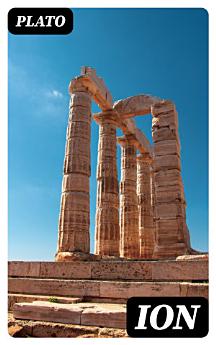Ion
sen 2022 · DigiCat
E-kitab
16
Səhifələr
family_home
Uyğundur
info
reportReytinqlər və rəylər doğrulanmır Ətraflı Məlumat
Bu e-kitab haqqında
In "Ion," Plato explores the nature of poetic inspiration through a dialogue between Socrates and the rhapsode Ion. The text masterfully dissects the relationship between the poet, the audience, and the divine, positioning poetry as a medium that evokes emotion rather than communicates knowledge. The literary style is characterized by Socratic dialogue, employing probing questions that reveal deeper philosophical insights on art and its role in society. This work is situated in the context of Classical Athens, where the interplay between thought and creativity was undergoing significant examination, reflecting the intellectual currents of Plato's time. Plato, a pivotal figure in Western philosophy, often grappled with the implications of art and beauty in his works. His experiences in a society rich in cultural expression, combined with his educational background as a student of Socrates, deeply informed his analysis in "Ion." The text serves as a critical reflection of his concerns regarding the influence of poetic art on moral and intellectual development, providing insight into his broader philosophical inquiries. "Ion" is a must-read for anyone interested in the philosophy of art and the dynamics of artistic expression. By engaging with Plato's thoughts, readers will gain a profound appreciation for the complexities of creativity and inspiration, enriching their understanding of both poetry and philosophy.
Müəllif haqqında
Plato (circa 427-347 BCE) stands as one of the pivotal figures in the development of Western philosophy. Born in Athens to an aristocratic family, he was a student of Socrates and later became the teacher of Aristotle. After Socrates' execution, Plato traveled extensively, absorbing philosophical influences, before returning to Athens and establishing his own school, the Academy. Plato's philosophy encompassed a wide range of topics including ethics, metaphysics, and politics. His dialogues, written as dramatic conversations involving Socrates and other contemporaries, have been influential in the philosophical canon. One of the lesser-discussed yet illuminating works among Plato's dialogues is 'Ion', a short piece exploring the nature of poetic inspiration. In this work, Plato examines the role of divine influence on poets and their intermediation between the gods and humanity. He investigates the concept of whether skill in art comes from knowledge or divine inspiration, a theme resonant in his other works. Plato's contribution to philosophy extends beyond his own writings; his portrayal of Socrates has profoundly impacted how Socrates and his philosophies are perceived. The Platonic ideals, such as his theory of forms, have become fundamental to Western philosophical thought, establishing Plato not only as an acclaimed author but also as a timeless intellectual figure whose ideas continue to provoke contemplation and debate.
Bu e-kitabı qiymətləndirin
Fikirlərinizi bizə deyin
Məlumat oxunur
Smartfonlar və planşetlər
Android və iPad/iPhone üçün Google Play Kitablar tətbiqini quraşdırın. Bu hesabınızla avtomatik sinxronlaşır və harada olmağınızdan asılı olmayaraq onlayn və oflayn rejimdə oxumanıza imkan yaradır.
Noutbuklar və kompüterlər
Kompüterinizin veb brauzerini istifadə etməklə Google Play'də alınmış audio kitabları dinləyə bilərsiniz.
eReader'lər və digər cihazlar
Kobo eReaders kimi e-mürəkkəb cihazlarında oxumaq üçün faylı endirməli və onu cihazınıza köçürməlisiniz. Faylları dəstəklənən eReader'lərə köçürmək üçün ətraflı Yardım Mərkəzi təlimatlarını izləyin.








